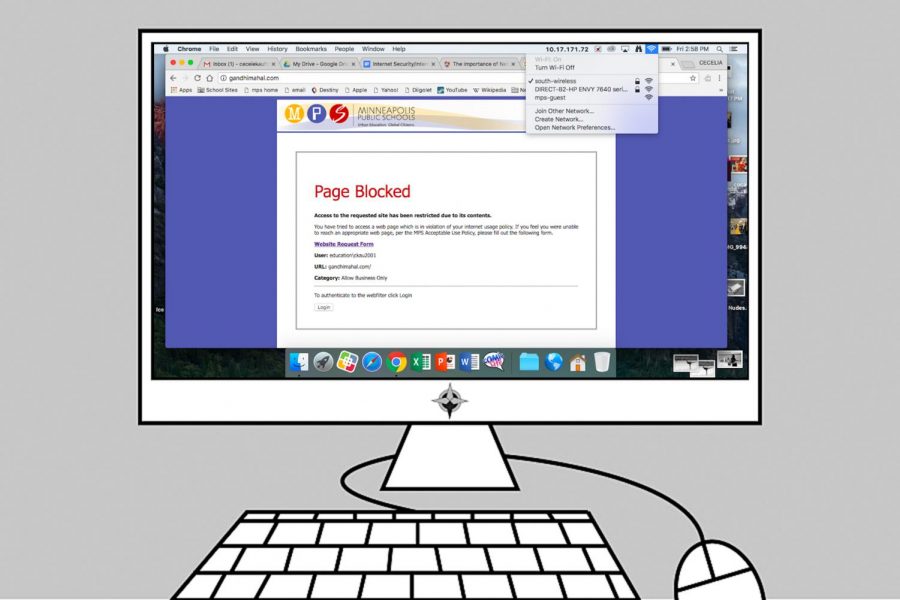Blocked: What does MPS do to keep us safe online?
Students and staff are sometimes faced with the “Page Blocked” pop up when they are trying to complete a project or anything else while on the school wifi. Along with websites, social media apps like Snapchat, Facebook, and Instagram are also blocked on phones if students are on school wifi. Graphic: Eli Shimanski
If you’ve ever surfed the internet while at school, to play a game or work on a paper, you know how annoying it is when a “Page Blocked” pops up. It can be difficult to experience this when trying to complete a research assignment or other school work. With all the dangers of the internet, such as hacking, stolen identity, and leaked photos, the internet is a risky place for teens. It’s clear why students are sometimes nervous using the internet, but what’s the purpose of the blocking websites? How does it benefit us?
One of the ways Minneapolis Public Schools (MPS) and the U.S. government work to protect youth from dangerous things online is through an act called the Children’s Internet Protection Act (CIPA). Congress enacted CIPA in 2000 to, “address concerns about children’s access to obscene or harmful content over the Internet,” according to Federal Communications Commision. This act imposes that schools and libraries are required to implement an internet security policy.
The district uses the website PaloAlto to decide which websites to block. Chris Andersen, South High’s Information Technology (IT) head, explained how the system decides which websites to block: “Websites get assigned a…category and that category can fluctuate, but basically the districts can choose what to block and then any website that is assigned that category would be blocked.”
Justin Hennes, the Director for IT in MPS, said in an email, “when students come across a website they believe should or shouldn’t be blocked they should notify a teacher or staff member. Teachers and staff members have access to a form on the staff intranet where they can request a website be blocked or unblocked,” said Hennes. The teacher would send an email to the district and they would refer it to PaloAlto. Although the district have the ultimate say in what websites they should refer to PaloAlto, PaloAlto has the final say in what remains blocked and what shouldn’t.
Sophomore Jordan Dotson expressed frustration over site blocking: “It’s very annoying when I’m trying to do a project of some sort and a website is blocked. It makes the process of completing the work a lot more of a hassle… I have to do the work at home.” Some blocked websites are school sports pages, math help websites like Slader, and Facebook, which many school groups use to communicate with their members.
When asked why the district hasn’t blocked KKK, white supremacy, and other extremist websites, Hennes explained, “other websites, some with questionable content, fall in the “extremism” category. These are currently unblocked as this category includes a lot of domains. We are and will continue to look into these in collaboration with General Counsel and the Teaching and Learning Department.”
One of the ways the district tries to help teach students how to be safe online is through a program called Second Step. This program, along with other videos in the series, teach younger students in elementary and middle school how to use social skills like empathy and kindness in the real world. They also include segments on how to be safe while surfing the internet. “Students receive lessons about how to use safely use the internet as a source of information and a way to connect with others in health classes, media studies and in advisory lessons,” explained Julie Young-Burns, Social Emotional Learning Team Coordinator for Student Support Services at the district, in an email. “In high school, many of these same lessons on being an informed consumer of electronic media, responding to cyber-bullying and personal decision-making are continued in health and advisory.”
Another resource Young-Burns recommends for students and staff is a website called Common Sense Media. This website, offers reviews by students, teachers, and parents alike about certain websites, social media apps, and even celebrities. It also offers lessons for parents and teachers about screen time and how to be aware of how to talk to kids about certain things in the media.

Cece Kaufmann is enjoying her first year at the Southerner and is someone who's always prepared to jump over any hurdles that get in her way. This sophomore...

